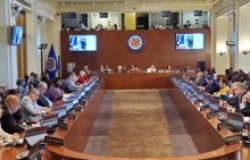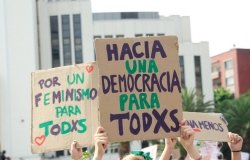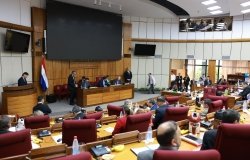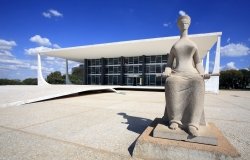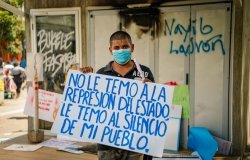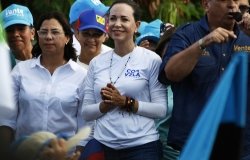
A blog of the Latin America Program
Ecuador’s New Leader Faces Daunting Security and Economic Challenges

Ministry of Interior, Ecuador
Ecuadorian President Daniel Noboa’s election in October came as a surprise. The 35-year-old heir to a banana empire was an unknown figure in national politics until last year, when he launched a presidential candidacy and exceeded expectations in a debate. His conciliatory tone at a time of polarization and political violence–including the assassination of anti-corruption candidate Fernando Villavicencio–and his emphasis on job creation excited voters, especially young ones.
Still, many observers were skeptical that Noboa, the country’s youngest president in recent history, had the experience to address Ecuador’s daunting economic and security challenges, especially given his abridged timeline. (Last year’s special election was to complete the remaining 18 months of former President Guillermo Lasso’s term.)
The once-peaceful nation is grappling with a surge in violent crime linked to drug trafficking organizations, with homicides up from five per 100,000 inhabitants in 2017 to 45 in 2023. As if that was not difficult enough, Noboa arrived at the presidential palace, Carandolet, with hardly enough money to cover basic government obligations, including the salaries of public employees.
Daniel Noboa arrived at the presidential palace, Carandolet, with hardly enough money to cover basic government obligations, including the salaries of public employees.”
Then, in early January, criminal organizations unleashed a wave of terror nationwide. The leader of the criminal gang Los Choneros escaped from prison, gangsters held prison guards hostage, set off car bombs, and stormed a TV station during a live broadcast.
Noboa declared a 60-day state of emergency, which he extended earlier this month for an additional 30 days. After declaring an “internal armed conflict,” the president designated 22 criminal gangs as terrorist organizations and deployed the armed forces to improve safety and wrest control of prisons from the inmates.
The initial results are mixed. Homicides dropped by over 30% in January compared to the month before, according to the National Statistical and Census Institute. February saw a further 25% decrease. However, other crimes have surged in Guayaquil’s metropolitan area, a hub for transnational drug-trafficking organizations. Extortion cases tripled in the first two months of the year compared to the same period in 2023. Kidnappings are also way up, according to Victor Herrera, the area’s police chief.
Nevertheless, more than 70% of Ecuadorians approve of the president’s security strategy, according to Comunicaliza, a pollster, and the president remains popular.
Noboa has also taken steps to address Ecuador’s economic troubles, and to generate resources to pay for crimefighting. Lawmakers approved a tax reform and an energy sector overhaul, and the president overrode a congressional veto to raise the value-added tax to fund anti-gang efforts. The fiscal reforms are designed to ease negotiations with the International Monetary Fund for a $3 billion agreement and pave the way for support from other international financial institutions.
Noboa also sought international support for his security policy, securing equipment and training from the United States and promises of cooperation from Brazil. Still, the recent extension of the state of emergency has raised questions about Ecuador’s long-term strategy. What will happen once soldiers return to their barracks?
The recent extension of the state of emergency has raised questions about Ecuador’s long-term strategy. What will happen once soldiers return to their barracks?”
For longer-term solutions, Noboa proposed an 11-question plebiscite that would clarify the role of the armed forces in internal security, increase criminal sentences, and permit extradition. He is building the country’s capability to carry out sophisticated criminal investigations, and he recently announced specialized units to combat extortion, kidnapping, and money laundering.
Still, broader structural reforms are essential, including to fight public corruption in rule of law institutions. That includes the courts and police, where criminal organizations have developed ties, as was made clear by the recent “Metastasis” and “Purge” investigations. Noboa should also do more to create alternatives for Ecuadorian youth who are likely targets for gang recruitment.
None of this is easy, but Noboa’s popularity and pragmatism offer a rare opportunity to address the interconnected challenges of security and the economy in Ecuador.
About the Author


Latin America Program
The Wilson Center’s prestigious Latin America Program provides non-partisan expertise to a broad community of decision makers in the United States and Latin America on critical policy issues facing the Hemisphere. The Program provides insightful and actionable research for policymakers, private sector leaders, journalists, and public intellectuals in the United States and Latin America. To bridge the gap between scholarship and policy action, it fosters new inquiry, sponsors high-level public and private meetings among multiple stakeholders, and explores policy options to improve outcomes for citizens throughout the Americas. Drawing on the Wilson Center’s strength as the nation’s key non-partisan policy forum, the Program serves as a trusted source of analysis and a vital point of contact between the worlds of scholarship and action. Read more
